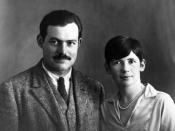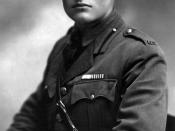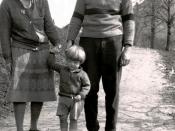Would you read a book knowing that its author died with the brutal taste of self-inflicted cold steel in the back of his throat? Many have oblivious to this detail. Many choose to ignore this gruesome fact because of the great literacy written beforehand. World War I had a profound effect on everyone it touched. The results of the incidents that Ernest Hemingway experienced during the war, changed him as a man, eventually led to his death, and are reflected in his works.
Grace Hall Hemingway pleased her husband, Dr. Clarence Hemingway, by giving birth to their first son and second child of six, Ernest Miller, on July 21, 1899 in Oak Park Illinois. As a teenager, Hemingway was continually rejected from the army because of a defective right eye inherited from his mother. He finally finagled a way into the military--as an ambulance driver. At nineteen, he was injured in the Austro-Italian territory.
He was hospitalized in Milan, where he met and fell in love with a nurse, Agnes von Kurowsky, who turned down his marriage proposal because of his young age. In 1921, back in Illinois, he married Hadley Richardson, and the two moved to Paris, France where they had a son. In 1926, Hemingway left Hadley and their son for Pauline Pfeiffer, a fellow writer. She gave a difficult cesarean section birth to their son, Patrick. That same year, 1928, Clarence Hemingway committed suicide with a revolver after suffering from diabetes and similar problems. During the Spanish Civil War in the 1930's, he worked as a journalist in Spain. He and Pauline divorced in 1940, leaving her with their two sons, to marry Martha Gellhorn, a fellow journalist he had met through the Spanish Civil War. The couple moved to San Francisco de Paula near Havana,


